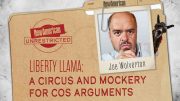
An assortment of new restrictions on the Second Amendment in Florida also launched an attack on the Fourth Amendment, as well. As The New American noted last week, Florida’s new “red flag” law abrogates the Fourth Amendment on the way to violating the Second Amendment:
Simply put, someone who thinks someone else might be a danger to himself or others can present his arguments to a judge who then, based upon those arguments, is free to decide whether the state (police armed with guns and badges) can forcibly remove privately and legally owned firearms from that person’s possession. The “red flag” provisions do not allow the person charged to defend himself or even to know who his accuser might be. Further, he must prove his innocence in order to get his confiscated firearms returned to him. He is “guilty until he proves himself innocent.”
All in violation of the Fourth Amendment, which states: “The right of the people to be secure in their persons, houses, papers, and effects, against unreasonable searches and seizures, shall not be violated, and no Warrants shall issue, but upon probable cause, supported by Oath or affirmation, and particularly describing the place to be searched, and the persons or things to be seized.”
Jonas Oransky, deputy director of Michael Bloomberg’s Everytown for Gun Safety, was delighted, calling the adoption of such laws a “new frontier” in the long war against private gun ownership in America:
We think of this as a new frontier. We don’t have a perfect system in this country, and we can’t stop every act of gun violence. This is a way for states to take some care and be somewhat nimble when there is a dangerous case.
Keeping governments from being “somewhat nimble” was the primary reason the Founders added the Fourth Amendment to the Constitution. In fact, without the Bill of Rights that contains it, the Constitution would never have been ratified. The reason why was perfectly described by Thomas Jefferson: “In questions of power, then, let no man be heard of confidence in man, but bind him down from mischief by the chains of the Constitution.”
But, goes the argument, there was a chance, perhaps even a good chance, that had local police had such power, they might have been able to head off Nikolas Cruz before he unleashed his attack in Parkland, Florida on February 14. After all, Cruz killed squirrels with a pellet gun, trained his dogs to attack a neighbor’s piglets, posted on Instagram about guns and killing animals, and eventually threatened a local teenager. In addition, he showed signs of depression and had been treated at a mental health clinic.
Joshua Horwitz, executive director of another rabidly anti-gun group, the Coalition to Stop Gun Violence, said, “This morning [four days after the massacre] I heard the sheriff [in Parkland] lament the fact that he did not have the tools to remove the firearms from the shooter. Had he [the shooter] lived in one of those states where this law is in place, he [the sheriff] would have had the tools, and this shooting might have been averted.”
Momentum currently favors adoption of such “red flag” laws as pressure from those wanting to confiscate firearms builds on legislators who are increasingly being urged to do something — anything — to curb such violence. Florida is the seventh state to adopt such laws, along with California, Connecticut, Indiana, Oregon, Washington, and Rhode Island. At least 24 other states are considering such legislation including Alabama, Alaska, Arizona, Delaware, Hawaii, Illinois, Iowa, Kansas, Kentucky, Maryland, Massachusetts, Michigan, Minnesota, Missouri, New Jersey, New York, North Carolina, Ohio, Pennsylvania, Tennessee, Utah, Vermont, and Virginia.
The law in Indiana doesn’t even require a judge. Law-enforcement officers can decide on their own to confiscate weapons from someone guilty only of a “precrime.”
That term is familiar to viewers of the 2002 film Minority Report. Set in Washington, D.C. in 2054, PreCrime, a specialized police department, apprehends potential criminals before they have committed a crime based on “foreknowledge” provided by three psychics called “precogs.” In Seattle, Washington, the group is called the “Crisis Response Squad” — a division of the Seattle Police Department — and has already pre-identified pre-criminals before they committed atrocities and seized their legally owned firearms. On March 1, one of those identified as a “precriminal” didn’t comply with the court order and made the headlines when police entered his residence and forced him to relinquish his weapons. KOMONews.com covered the incident, informing its readers that the 31-year-old man hadn’t committed a crime but was guilty of “escalating behavior,” whatever that means. Some workers at a local restaurant, according to KOMO News, said the defendant “harassed” them while he was carrying a holstered firearm (which is legal there). KOMO News added that this man’s “precrimes” included a history of police seizing a shotgun from him “in a different incident.” After entering his residence with the so-called warrant (based not on “probable cause” but on the much lower standard of “reasonable cause”), the police not only retrieved a .25 caliber handgun but then entered the residence of one of the man’s family, where they hoped to find some other firearms belonging to him.
KATU.com in Seattle covered the same incident, shedding additional light on the man’s “precrimes”: “Neighbors said he had been intimidating people for the past year — even staring-down customers through store-front windows with a gun holstered at his side…. Mental illness is suspected.”
KATU unearthed even more incriminating evidence that the man was about to commit a crime. A man living in the suspect’s apartment complex stated, “He was roaming the hallways with a .25 caliber automatic. And it created a lot of fear [in me] obviously because I didn’t know if he was coming after me or gonna just start shooting the place up.” When he learned that the police were able to seize the man’s firearms without a “probable cause” warrant, as required under the Fourth Amendment, but instead use an ERPO (Extreme Risk Protection Order) or GVRO (Gun Violence Restraining Order) warrant, he was able to breathe more easily. The precriminal had been deprived of his firearms. Said the neighbor: ”I’m very supportive of this law. This is a perfect case in point where it’s had some efficacy. It was an immediate crisis and law enforcement was able to remove his firearms, so it very well could have save lives.”
It’s “a perfect case in point” that illustrates why there’s a Fourth Amendment to the Constitution: to keep police from willy-nilly entering anyone’s dwelling on the thinnest of excuses and confiscating his firearms.
Here’s a summary of ERPO law from Washington State: It may be filed against any “person who poses a significant danger of causing personal injury to self or others in the near future by having firearms.” The petition can be filed “by a law enforcement agency, a law enforcement officer, or a person who is a family or household member of the respondent [the precriminal].” Family members include “dating partners,” “persons who reside or have resided with the respondent within the last year,” and “stepparents or stepchildren and grandparents and grandchildren.” No crime has been committed. Just suspicion by these honorable folks that said “respondent” might commit one in the future.
The judge makes his ruling without the “respondent” being present, although he will be invited into the judge’s courtroom after the warrant has been issued. At that time the “respondent [will] immediately surrender all firearms and concealed carry license to the [police] officer.” If he resists, he has 48 hours to comply. Otherwise said “officer” will make a visit to the “respondent’s” residence to confiscate them, by force if necessary.
Freedom lovers have been put on notice. These “red flags” are flying all over the country, threatening Second Amendment rights through the deliberate abrogation by states of precious Fourth Amendment rights. For readers who live in one of those 24 states where such bills are pending, it’s past time to let legislators know of your strong opposition to them. Do it now, before an ERPO is issued in your case for being mentally deficient for not knowing in advance what’s good for you.
An Ivy League graduate and former investment advisor, Bob is a regular contributor to The New American magazine and blogs frequently at LightFromTheRight.com, primarily on economics and politics. He can be reached at [email protected].
Related article:




